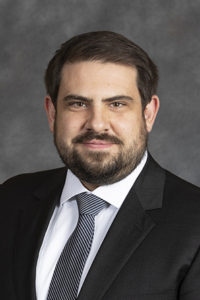ARPA funds sought for second Lincoln water source
A proposal intended to use federal American Rescue Plan Act funds to help Lincoln find a new source of drinking water was heard by the Appropriations Committee March 14.

LB506, sponsored by Lincoln Sen. Eliot Bostar, would appropriate $200 million in ARPA funds in fiscal year 2023-24 to the state Department of Natural Resources. The department then would award a grant to a primary class city to fund a water treatment plant, land acquisition, wellfields, permitting, pumping and transportation costs to provide potable water to the city.
Lincoln is the state’s only primary class city.
The bill also would authorize that $20 million of the transfer be directed to small and rural communities to install reverse osmosis systems in community water systems where drinking water test levels are above 10 parts per million of nitrate and, if deemed an appropriate use of the funds, also for private wells.
Bostar said securing a second water source for Lincoln and surrounding communities is one of the most pressing objectives for the region. The city’s current population of roughly 291,600 is expected to grow to nearly 470,000 by 2060, he said, and it likely will take decades to find and secure a water source capable of serving that many residents.
Not only does the city need more water as its population grows, he said, it also needs a second water source should the Platte River wellfields be damaged, either through severe drought or flooding. That could result in Lincoln asserting its water rights at the expense of agricultural irrigation interests, something he said no one wants to see happen.
Bostar said a 27-member task force put together to study the issue determined in 2022 that a wellfield and treatment facility along the Missouri River is the best option.
“Southeast Nebraska needs LB506 for the long-term success of our smaller villages and cities as well as our larger communities,” Bostar said. “It’s imperative that we capture this opportunity to invest in the economic, agricultural and public health of our future.”
Elizabeth Elliott, director of Lincoln Transportation and Utilities, testified in support of the measure, saying the need for a second water source was underscored by recent flooding.
“The damage caused by that 2019 flood highlighted the vulnerability of our wells in the Platte River,” she said. “We were lucky that, although the damage was extensive, we were still able to provide water to Lincoln residents and businesses. If additional steps aren’t taken, we may not be so lucky next time.”
The Ashland wellfield has been in use for almost 100 years, she said, and based on water modeling no longer will be able to handle the city’s demand by 2048. The estimated cost of a replacement system is estimated at $1.3 billion and would take 20 years to build, Elliott said, but doing so would benefit the entire state by ensuring adequate water for the city, surrounding communities and agricultural interests.
Waverly city administrator Stephanie Fisher also testified in support of LB506. Waverly is facing a potential crisis regarding rising nitrate levels in the city’s water supply, she said, and could benefit from the reverse osmosis funding in the bill or by purchasing drinking water directly from Lincoln in the future.
“This legislation is a chance — not just for Lincoln, but for the surrounding communities as well — to secure long-term, safe drinking water,” Fisher said. “Southeast Nebraska needs this funding in order to protect our growing small communities as well as our urban centers.”
No one testified in opposition to LB506 and the committee took no immediate action on it.

